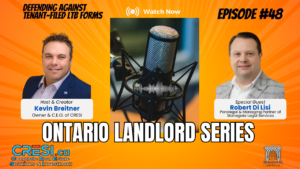This comprehensive guide is based on insights from our latest Ontario Landlord Series podcast episode. Our property management experts dive deep into challenging Ontario landlord tenant rights scenarios that Greater Toronto Area landlords face daily.
Dealing with challenging Ontario landlord tenant rights scenarios? As experienced property managers in the Greater Toronto Area, we encounter common landlord-tenant situations daily. This comprehensive guide breaks down exactly what Ontario property owners need to know about their rights and responsibilities.
Essential Ontario Landlord Tenant Rights Scenarios to Understand
The Ontario Residential Tenancies Act outlines specific procedures for these common landlord-tenant scenarios. Let’s explore what the Ontario Landlord Tenant Board says about handling each situation properly.
Tenant Abandonment Rights in Ontario
When facing potential tenant abandonment scenarios in Ontario, follow these steps:
- Never assume abandonment without proof
- Issue proper 24-hour written notice before unit inspection
- Document everything with photos and videos
- File an N4 notice for unpaid rent
- Await Landlord Tenant Board hearing dates
For Greater Toronto Area landlords, remember: Even if neighbors suggest the tenant has abandoned the unit, they could be traveling or hospitalized. Following proper Ontario landlord-tenant procedures protects your rights.
Death of Tenant Procedures for Ontario Landlords
Ontario landlords must follow specific steps when a tenant passes away:
- Contact local police immediately upon discovery
- Notify next of kin about personal belongings
- Provide the legally required 30-day period for item removal
- Process rent deposit returns according to Ontario regulations
- Maintain detailed documentation throughout
The Ontario Landlord Tenant Board allows families 30 days to clear the unit. After this period, landlords can legally dispose of remaining items.
Property Entry Guidelines for Ontario Rental Units
Understanding entry rights is crucial for Ontario property management:
- Post written entry notice directly on the door
- Provide full 24-hour notice before entry
- Clearly state your entry purpose
- Keep documented proof of notice
- Consider police assistance for repeated entry denials
According to Ontario rental regulations, landlords can file an N5 notice for entry refusal, though resolution through the Landlord Tenant Board typically takes 4-6 months.
Pet Policy Regulations in Ontario Rentals
For Greater Toronto Area rental properties, here’s what to know about pet policies:
- Ontario law doesn’t enforce “no pets” lease clauses
- Eviction solely for pet ownership isn’t permitted
- Special considerations exist for:
- Condominium corporation rules
- Landlords with documented allergies sharing the building
- Service animals (protected by Ontario human rights legislation)
Check your local condominium board’s specific regulations about pet sizes and limits.
At CRESI, we help Ontario landlords navigate these common scenarios every day. Our property management team understands the complexities of Ontario landlord tenant rights scenarios and provides expert guidance through each situation.
Want more expert guidance on Ontario landlord-tenant situations? Subscribe to our YouTube channel for weekly tips and scenarios just like these. Our video library contains tons of guides covering everything from how to buy a tenanted home to how to collect arrears rent from a commercial property.
Related: Stress-free tools for landlords



